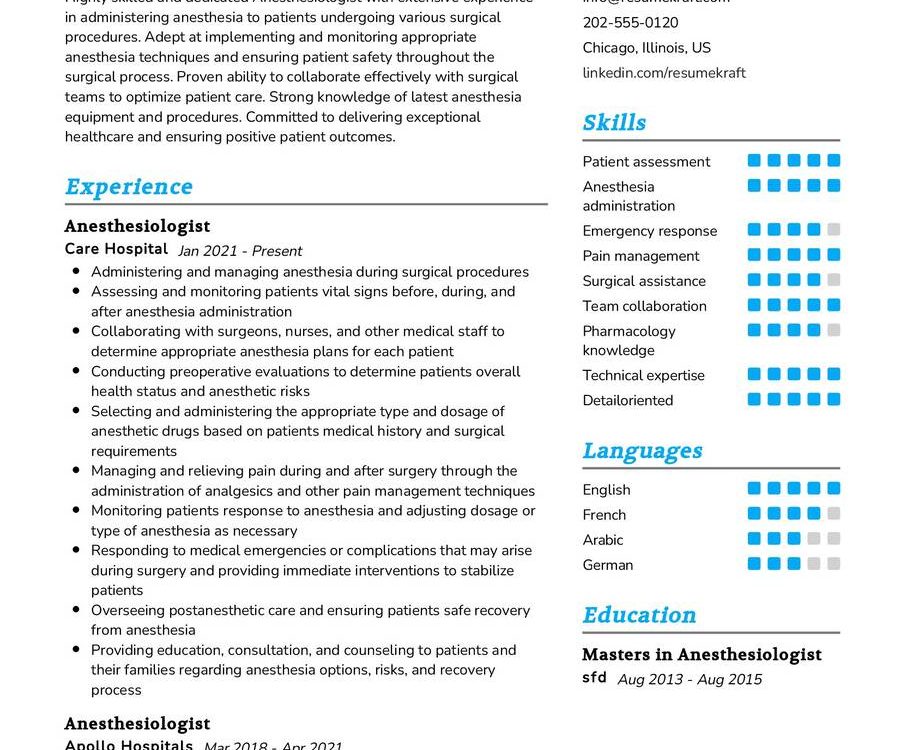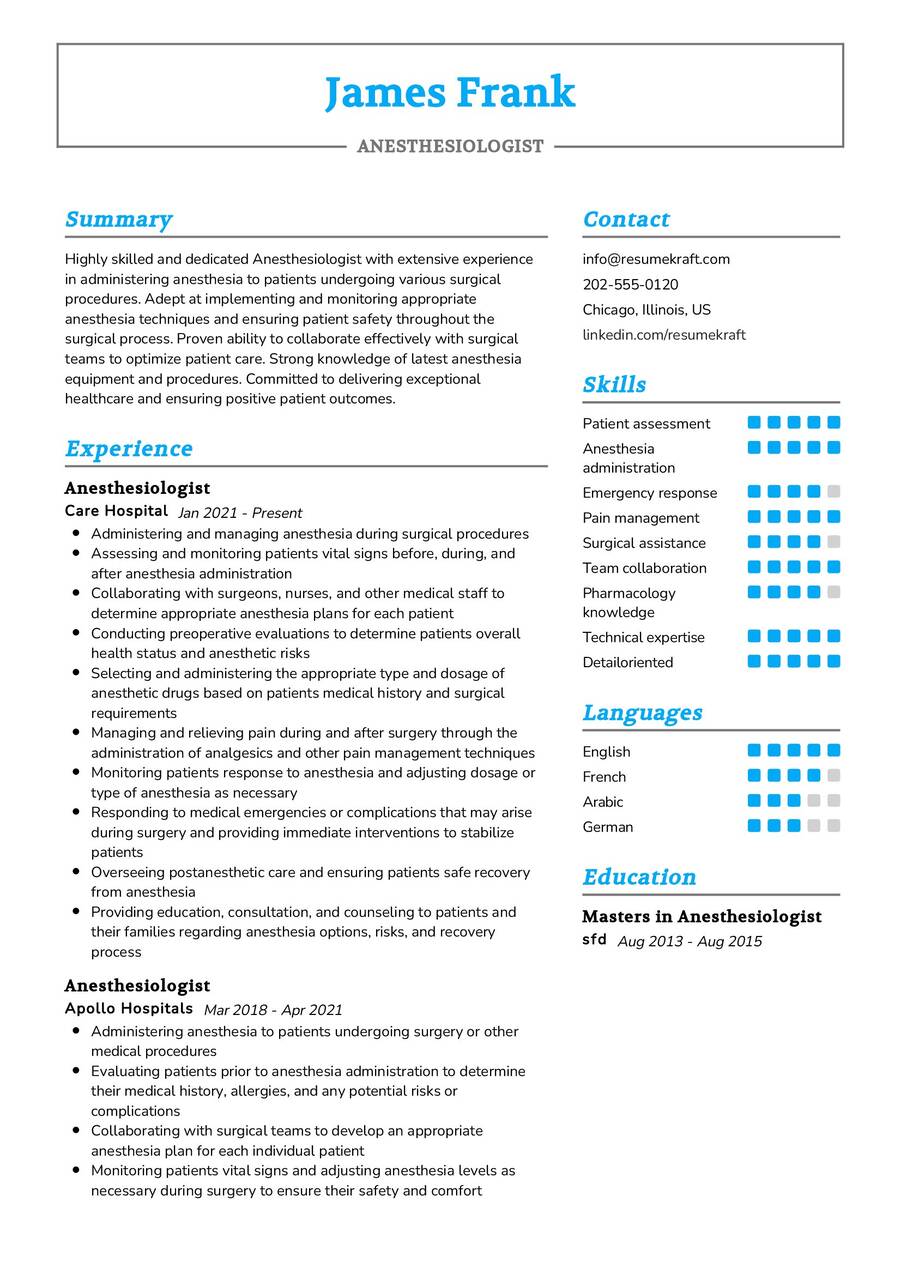Exploring the Role of an Anesthesiologist
As the world of medicine continues to advance, the role of an Anesthesiologist remains crucial in ensuring the comfort and safety of patients undergoing surgical procedures. This article delves into the multifaceted responsibilities and requirements of an Anesthesiologist, a profession that demands a delicate balance between medical expertise and compassionate care.
An Anesthesiologist plays a pivotal role in the operating room, administering anesthesia to patients, monitoring their vital signs, and ensuring a pain-free experience. This profession requires a deep understanding of medical principles, strong communication skills, and the ability to make split-second decisions. Let’s explore the intricacies of being an Anesthesiologist and the path to excelling in this vital healthcare role.
Qualifications for Becoming an Anesthesiologist
Becoming an Anesthesiologist is a journey that involves rigorous education, hands-on training, and a commitment to patient care. Here are the key qualifications and requirements for aspiring Anesthesiologists:
- A Doctor of Medicine (MD) or Doctor of Osteopathic Medicine (DO) degree from an accredited medical school.
- Successful completion of a residency program in anesthesiology, typically lasting four years.
- Board certification from the American Board of Anesthesiology (ABA) or the American Osteopathic Board of Anesthesiology (AOBA).
- State licensure to practice medicine as an Anesthesiologist.
- Strong knowledge of pharmacology, physiology, and patient care.
- Effective communication skills to interact with patients, surgical teams, and other healthcare professionals.
- Ability to stay calm under pressure and make quick decisions in critical situations.
Continued professional development and staying updated with the latest advancements in anesthesia are essential aspects of excelling in this field.
Responsibilities of an Anesthesiologist
The role of an Anesthesiologist is diverse, encompassing various responsibilities that contribute to the well-being of patients during surgical procedures. Here are the key responsibilities of an Anesthesiologist:
- Conducting preoperative assessments to evaluate the patient’s medical history and determine the appropriate anesthesia plan.
- Administering anesthesia and monitoring the patient’s vital signs throughout the surgical procedure.
- Adjusting anesthesia levels as needed and addressing any complications that may arise during surgery.
- Collaborating with surgeons and other healthcare professionals to ensure a safe and effective surgical experience.
- Providing postoperative care and managing pain relief for patients in the recovery room.
- Staying informed about new anesthesia techniques, medications, and technologies.
- Participating in multidisciplinary medical teams to enhance patient care and safety.
Each responsibility requires a blend of technical expertise, critical thinking, and empathy for the patient’s well-being.
Building Your Anesthesiologist Resume
Crafting a compelling resume is essential for showcasing your skills and experience as an Anesthesiologist. Here are some tips to create an impactful Anesthesiologist resume:
- Highlight your education and training, emphasizing your medical degree, residency, and board certification.
- Showcase your experience in diverse surgical settings, detailing the types of procedures you’ve been involved in.
- Include any leadership roles, such as leading anesthesia teams or contributing to medical committees.
- Emphasize your ability to collaborate with surgical teams and communicate effectively with patients.
- Mention any specialized skills or certifications related to specific types of anesthesia or medical technologies.
Your resume is a reflection of your expertise and dedication to providing exceptional patient care as an Anesthesiologist.
Anesthesiologist Resume Summary Examples
Your resume summary serves as a snapshot of your career and capabilities. Here are examples of impactful Anesthesiologist resume summaries:
- “Dedicated Anesthesiologist with a Doctor of Medicine degree and extensive experience in administering anesthesia for a wide range of surgical procedures.”
- “Board-certified Anesthesiologist with a proven track record of ensuring patient safety and comfort during surgeries, collaborating seamlessly with surgical teams.”
- “Detail-oriented Anesthesiologist with a commitment to staying updated on the latest advancements, providing compassionate care for diverse patient populations.”
Each summary encapsulates the core strengths and achievements that set you apart as an Anesthesiologist.
Key Skills for Anesthesiologists
Your skill set as an Anesthesiologist is a blend of medical expertise, interpersonal skills, and the ability to handle high-pressure situations. Here are the key skills for Anesthesiologists:
Soft Skills:
- Effective communication with patients and healthcare teams.
- Empathy and compassion for patients’ well-being.
- Attention to detail and precision in administering anesthesia.
- Adaptability and quick decision-making in critical situations.
- Collaboration within multidisciplinary medical teams.
Hard Skills:
- Expertise in various anesthesia techniques and medications.
- Proficiency in monitoring equipment and technology.
- Knowledge of pain management strategies and medications.
- Understanding of surgical procedures and potential complications.
- Continuous learning and staying updated on medical advancements.
Each skill contributes to your ability to provide safe and effective anesthesia care.
Common Mistakes to Avoid in Your Anesthesiologist Resume
Creating a strong Anesthesiologist resume requires avoiding common pitfalls. Here are mistakes to steer clear of:
- Avoid generic statements; tailor your resume to highlight your unique qualifications and experiences.
- Focus on achievements rather than listing routine job duties.
- Include a well-crafted cover letter to complement your resume and provide additional insights.
- Ensure your resume is accessible to a wide audience by avoiding excessive medical jargon.
- Thoroughly proofread your resume to present a polished and professional image.
Each mistake avoided strengthens your resume and enhances your chances of standing out in the application process.
Conclusion: Shaping Your Anesthesiology Career
As you navigate the realm of anesthesiology, remember that your unique skills and experiences contribute to the holistic care of surgical patients. Craft a resume that reflects your dedication to excellence and patient well-being. For additional assistance in creating a standout application, feel free to utilize resources like AI Resume Builder, Resume Design, Resume Samples, Resume Examples, Resume Skills, Resume Help, Resume Synonyms, and Job Responsibilities.
Take the next step in your anesthesiology career with confidence, knowing that your resume is a powerful tool in presenting your qualifications and dedication to patient care. Best of luck!


